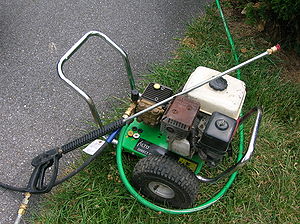Pressure washing

A pressure washer is a mechanical device that uses high-pressure water to remove mold, grime, dust, mud and dirt from surfaces and objects such as buildings, vehicles and concrete road surfaces. Equipment can be rented or bought that produces pressures from 120 bars up to around 1200 bars or even more.
The most basic pressure washer consists of:
- a motor which directly drives a water pump
- high pressure hose
- trigger gun
Just as a garden hose nozzle is used to increase the outflowing pressure of the liquid, this machine adds its own power to force high pressure, when a regular nozzle would slow the flow, due to its restricting nature. Note that the pump does not draw more water from the pipe to which the washer is connected than that source can provide; therefore, the water supply must be adequate for a given machine to be connected to it: its flow must be equal or superior to that of the washer, so that the pump is never starved (which can damage it, see Cavitation).
Several different types of nozzles are available, each useful for a particular application. Some nozzles cause the water jet to be ejected in a triangular plane, while others emit a pencil-thin jet of water, which spirals around rapidly. Most nozzles attach directly to the trigger gun.
Some pressure washers, in combination with a particular nozzle, allow detergent to be introduced into the water stream, assisting in the cleaning process. Two types of chemical injectors are available: a low-pressure injector and a high pressure injector.
Pressure washers are dangerous tools and should be operated with due regard to safety instructions. The water pressure near the nozzle is powerful enough to strip flesh from bone. Objects in the water supply can be ejected from the nozzle at great velocities. The cleaning process can propel objects from the surface being cleaned, also at great velocities. Pressure washers have a tendency to break up asphalt if aimed directly at it, due to high pressure water entering cracks and voids in the surface.
Most readily available consumer units (commonly found online or at hardware stores) are electric or gas powered. The electric ones plug into a normal outlet and use/produce cold water, and typically deliver pressure up to about 2000psi. Gas powered units can often deliver twice that pressure, though due to the hazardous nature of the gasoline exhaust they are unsuitable for enclosed and/or indoor areas. Some models can generate hot water, which can be ideal for loosening and removing oil and grease.
Uses

In its extreme high pressure form, water is used in many industrial cleaning applications requiring the removal of surface layers as well as dust-free cutting of some metals and concrete. For exterior applications, gas or propane powered pressure washers provide enhanced mobility not available in electric models, as they do not require use in proximity to an electrical outlet. However, for indoor applications, electric pressure washers produce no exhaust and are much quieter than their gas or propane powered counterparts.
High-pressure water at medium pressure, in combination with special chemicals, aids in the removal of graffiti. This process (especially when the water is hot) is used as a quick rinser of the softened graffiti. Sometimes people use a pressurized mixture of air/sand or water/sand to blast off the surface of the vandalized area, thus etching the surface and therefore making it extremely difficult for anyone to ever use high-pressure cleaning as a follow-up process. Sandblasting, when used in graffiti removals, often overcleans a surface and is capable of leaving a permanent scar on the building surface. Compare to sandblasting.
Types
Pressure washers are classified into following groups based on the type of fuel/energy they consume.
- Electric pressure washer
- Diesel pressure washer
- Petrol pressure washer
- Gas pressure washer
- Ultra High Pressure Washers
- Hydraulic High Pressure Washers
